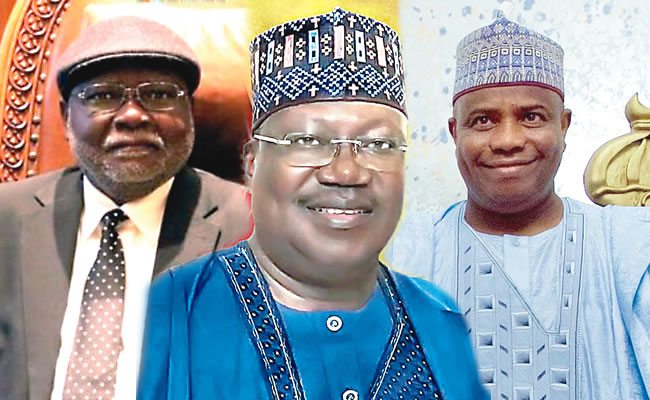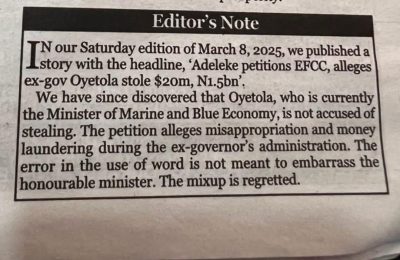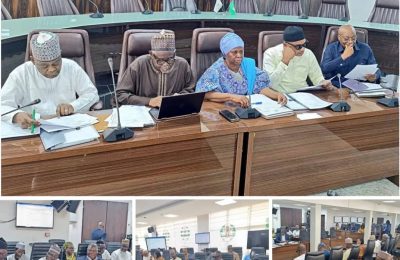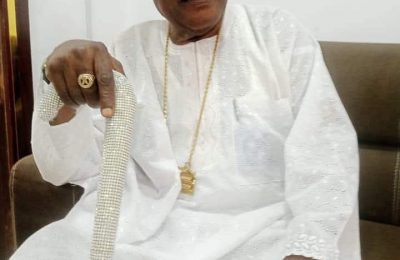
2022 was a watershed for the Judiciary. It was the first time all Justices of the Supreme Court would rise against a sitting Chief Justice of Nigeria and successfully effect a regime change. But it is not uhuru for the arm of government which entered new year, to face the rigour of adjudicating the 2023 poll. A major face-off is also in the offing with the executive arm of government at the state level. LANRE ADEWOLE, YEJIDE-GBENGA OGUNDARE and SEGUN KASALI, measured the impacts expected of the Judiciary this year, through the lens of front-row members of the Bar.
With 25 state governments seeking “independence” from the National Judicial Council (NJC) in the administration of the justice system of their various jurisdictions, the Nigerian Judiciary entered the new year, with a big battle.

In a joint request to the National Assembly, the 25 states, through their Houses of Assembly, demanded that the federal lawmakers must first amend the 1999 Constitution, to include State Judicial Council, before they would sign in, on other amendments proposed by the federal legislature.
A desperate National Assembly leadership had openly pleaded with the governors of the states holding the constitution amendment project hostage, saying that the exercise, targeting 44 major additions to the constitution, mustn’t be moribund.
However, the governors have shown no signs of backing down on their demand as the leadership of the National Assembly signaled its readiness to negotiate. If the federal legislature eventually conceded to the demand of the states, which are more than the required two-thirds majority to pass any alteration to the constitution, the justice system, will revert to pre-1999 when governors had absolute power over the state judiciary and made all judicial appointments, including that of the state chief judge, without any external input, against the current practice, of NJC having to recommend to them.
The coming of State Judicial Council, will also see states taking over the payment of salary of state high court judges, while a “deregulated” NJC would witness a scaled-down responsibility, limited to the Supreme Court, Court of Appeal, Federal High Court and other judicial institution under the purview of the Centre.
In all, a pare-down NJC, may end up catering to less than 800 federal judges.
Damilola Olawuyi, Senior Advocate of Nigeria, Professor of Law and Deputy Vice Chancellor (Academic), Afe Babalola University, Ado Ekiti (ABUAD), is for global best practices, when asked if the National Assembly should trade off NJC.
He said, “Section 271 (1) of the 1999 Constitution provides that the Governor shall appoint the Chief Judge of a State “on the recommendation of the National Judicial Council.” This provision contrasts sharply with Section 235 (1) of the then 1979 Constitution which provided that the Governor shall appoint the Chief Judge “on the advice of the State Judicial Service Commission.”
“There have therefore been clamours to amend the 1999 Constitution and return back to the 1979 constitutional framework which placed such appointments within the authority and purview of the states.”
He added, “These debates reflect the urgent need for true federalism in Nigeria. In truly federal countries such as Canada and the United States, the appointment of Chief Judges at state or provincial levels are done by the Governor on the recommendation of the State Judicial Service Commissions or equivalent bodies. In those countries, the National Judicial Council is mainly responsible for recommending to the President (or Prime Minister), the appointments to federal courts, including courts of appeal and the Supreme Court. The current provisions of the Section 271 (1) of the 1999 Constitution is therefore alien to true federalism.”
Further pushing for true federalism, the academic noted, “We cannot achieve true federalism without addressing this and several other lopsided and unitary provisions of the 1999 Constitution which deny state legislature and executive any real autonomy or oversight powers over important issues such as security, state judiciary and resource control amongst others.
“As you are aware, this urgent need for constitutional restructuring to enthrone true federalism in Nigeria has been consistently highlighted by eminent constitutional lawyers such as Aare Afe Babalola SAN as a national emergency and a prerequisite for access to justice and transformational governance in Nigeria.
“I fully agree with him and I think every well-meaning Nigerian should actively join their voices with the patriotic and well-considered call by Aare Afe Babalola, SAN to ensure that we achieve true constitutional restructuring in Nigeria.”
Different view.
Senior Advocate of Nigeria, Chief Yomi Aliyu has a different perspective and doesn’t want governors, anywhere closer to judges’ appointment.
Managing Partner, Bloomfield Law Practice, Barrister Ayodele Oni, also doesn’t support further localization of the judicial process or governors taking over.
According to Oni, “Before answering, it is worth noting how worrisome it is that State Governors have now moved on from mere lobbying to actual interference with the powers and duties of another arm of government. State Houses of Assembly have a constitutional duty to consider and where they deem fit, concur or disagree with the constitutional amendment proposed by the National Assembly. “It is shameful that Governors would so unashamedly interfere with the SHAs’ constitutional duties.
“On the substance of the question, one only need look back to the lengthy 2021 JUSUN strike to realize the extent to which governors hold the judiciary to ransom. Until the independence of the judiciary is palpably enshrined, I do not support any further localization of the judicial process” he stated matter-of-factly.
For Chief Aliyu, “Governors should not in any way be involved with the appointment of judges so as to insulate the appointment from political influence.”
He further noted that, “Like in other climes, appointment of judges should be on invitation as done in the past and not on application”, while recommending that “an independent body comprising leaders of the legal profession, NBA executives, senior judges and two members of the public should be saddled with the task.” Sadly, he alleges that, “Presently 50% of those appointed to the bench since 1999 are party faithful, especially at the High Court level. It is now a case of who pays the piper dictates the tune.”
Election Petition conundrum.
Beyond the executive effort to strip NJC of inclusive influence, another major issue confronting the Judiciary in the new year is adjudicating the 2023 poll without becoming a part of the problem to be fixed.
Already the election dispute adjudication in Ekiti State, is setting tongues wagging. Though an outlier governorship poll, with just two constitutional issues to be determined, it took the Election Petition Tribunal, exactly 54 days after adjourning for judgement, to deliver its ruling, thereby setting the state on the edge.
With a few days to the 180 days allowed by the constitution, the three-man panel, eventually did the needful, though legal practitioners still called for caution.
Professor Olawuyi told The Jury that, “The 1999 Constitution (as amended) and the Electoral Act (as amended) clearly provide a 180-day timeframe for the determination of election petitions by Election Tribunals. There is therefore an understandable concern that the 180-day deadline for the Ekiti election petition.
“However, we must never lose sight of the independence of the judiciary on matters brought before it. Judicial independence in its real sense means that a tribunal should be free from any improper influences, pressures, threats or interferences, direct or indirect, from any quarter or for any reason.
“I therefore think Nigerians should allow the electoral tribunal, which I am confident is well aware of the time constraint, to perform its role without any undue pressure and without reading any unsubstantiated meaning to the timing of its decision making process. In the end, if constitutional and electoral requirements relating to timing are not followed, then our laws empower the National Judicial Council to take adequate steps and measures as it has done in the past.”
Both Aliyu and Oni concurred.
“The apparent delay in the handing down of the judgment of the Ekiti Governorship Election Tribunal (the “*GET*”) ought to first be considered in the context of the constitutional window that GETs have” Oni pointed out, before adding that, “Provided that the GET delivers its judgment within 180 days, the integrity of the GET and/or of its members does not stand to be questioned.
“However, where my Lords fail to deliver their judgment within the timeline given by the constitution, then same would become invalid and then questions may then be asked and entertained as to the competence and/or integrity of the members of the GET. Until then, it’s most advisable to protect the reputations and persons of our judicial officers” he advised.
Chief Aliyu has this to say, “As long as it is within the constitutional time limit it is not the number of days that matters but writing a judgement that can stand before appellate Courts. Hasty justice is not justice. At times it is better to make haste slowly.”
“Judiciary should let votes count”
In the adjudication of the 2023 poll, lawyers have words for the participating judicial officers and the men of the Bar are not mincing them.
Barrister Oni says he is for speedy dispensation of justice in all situations, telling The Jury that “Regardless of elections, courts should ensure to structure themselves to ensure that non-election cases which also require speedy proceedings do not continue to suffer neglect for the benefit of election petitions and appeals therefrom.”
He however has a bigger task for the Bench on election matters. Alluding to a controversial judgement of the Supreme Court that handed a scorched victory, the senior lawyer cautioned, “The Judiciary should ensure not to allow a repeat of the judgment that enthroned Gov Hope Uzodinma (of Imo State) where judgments though fair, would be used to propagate illogicality in the full context of the facts. The courts (election petition tribunals, the Court of Appeal and the Supreme Court) should ensure to be fair and stellar as the outcome of 2023 elections/election-related litigation would play a huge role in balancing or worsening a nation which is already at the crossroads of disunity.”
Aliyu SAN raised a kind of an alarm. He wanted the Judiciary to stop installing winners in elections.
“Tongues are wagging” which according to him, was “on the usurpation of the popular votes by the Judiciary.”
He wants the courts to back off, saying “In no way should the Court substitute its own opinion for the lawful votes of the electorates. A person who did not have his name on the ballot papers should never be declared a winner simply because electorates are deemed to be voting for parties as opposed to an individual. This is fallacious because there are many instances where reverse is the case. Judiciary should let votes count.”
To avoid a backlash while settling the 2023 election disputes, Professor Olawuyi wants the Nigerian Judiciary to tap into its decades-old experience in conducting the controversial assignment.
He said, “History tells us that the Nigerian judiciary becomes super active during election cycles, ranging from electoral complaints regarding ballot qualification, voter registration, political party registration, to vote tabulation and transparency of electoral officers amongst others. The Judiciary has now had more than 20 years in resolving such election-related disputes and so we expect such accumulated experience to result in greater efficiency, constitutional due process, and a timely and effective handling of election disputes.
“Aside from avoiding the menace of conflicting decisions and orders, the judiciary must also stay clear of real or perceived conflict of interest or lack of independence. As a separate arm of government, the judiciary is expected to dispense justice without fear or favour.
“To participate in activities, events or discussions that may be interpreted as undue political interference with, or usurpation of the authority of the courts, is judicial misconduct which must be avoided by all levels of court in Nigeria. The preservation of the integrity and independence of the judiciary is so pivotal and indispensable to a free, fair and trustworthy electoral process in 2023” he noted.
Crippling the system for elections?
With close to 300 judicial officers, already assigned to election duties, some stakeholders are worried that the justice sector will be crippled again for politics. An executive member of the Nigerian Bar Association, Kunle Edun voiced his disapproval this way, “The names of about 257 Judges of various States’ High Courts, Federal High Court, National Industrial Court and some Chief Magistrates, were published to hear election petitions. Consequently, the selected judges will have to suspend hearing their regular matters for the period that they will be on this special assignment.
“Section 285(9) of the Constitution, as amended provides the basis for time factor in the determination of election petition disputes.
“Nigerian politicians know how to take care of themselves and their interests when the need arises. The Preamble of the provisions of the Fundamental Rights (Enforcement Procedure) Rules, 2009 requires that cases bordering on violations of fundamental rights of citizens of the federal Republic of Nigeria are to be given accelerated hearing. By the provisions of section 36(4) of the Constitution ‘any person charged with a criminal offence…shall..be entitled to a fair hearing within a reasonable time’
“These provisions are hardly complied with by the courts. We now have fundamental rights enforcement cases and criminal trials spending an average of two years and five years respectively at the trial court.
“No sense of urgency or priority given them, as required by the law. Sadly, these are now part of the cases that will be further adjourned for another 6 more months” he dejectedly pointed out.
Average rating?
In considering the Nigerian Judiciary for a performance rating for 2022, Professor Olawuyi delved into a comprehensive analysis.
“The Nigerian judiciary in 2022 continued to play its important role as the last hope for the common citizen” he appraised, adding, “we saw a number of landmark decisions on electoral, constitutional, criminal and business matters which have greatly strengthened our jurisprudence.”
He then went into the variables, saying “However, 2022 will also be remembered as the year in which the Supreme Court faced major and unprecedented internal upheavals that culminated in the sudden exit of the then Chief Justice of Nigeria, Justice Tanko Muhammad.
“More than anything else, this event brought to the fore the abysmally-poor state of funding for the judiciary.
“For many years, we have lamented that the average budget allocated to the judiciary in Nigeria has remained one of the lowest in the world for the last 10 years. The unattractive remuneration and benefits for judges has perennially reduced the prestige, autonomy, and independence of the judiciary.
“There is also the decayed, age-worn, and deplorable state of court rooms across Nigeria, with little or no access to modern technologies needed for the conduct of legal business. In addition to the discontent expressed by Supreme Court Justices over the state of poor funding for the judiciary, we also saw in 2022, threats of another prolonged strike by the Judiciary Staff Union of Nigeria (JUSUN).
“While significant progress has been made in 2022 in upwardly reviewing the welfare package of judicial officers at all levels of court in Nigeria, in the aftermath of the decision of the National Industrial Court, a lot more will need to be done in 2023 to expand and sustain such progress.
“The underfunding of the judiciary goes beyond salaries and welfare packages alone. The Nigerian judiciary is in dire and urgent need of modern technologies and infrastructure that will enable it to dispense justice in a timely, accessible and transparent manner if we are to advance the UN Sustainable Development Goal 16 on modern and reliable justice delivery in Nigeria.
“There is also the need for capacity development of judges through exposure to foreign best practices, developmental trainings, and seminars, especially in niche areas of law such as energy, environment, climate change, and technology law amongst others” he proposed.
For Aliyu, “the Judiciary has performed above average in 2022. Some judgments were delivered that made one to ask whether one was actually in Nigeria. The one I can easily remember was that of Nnamdi Kanu by Justices of the Court of Appeal. A background check of those justices revealed that they were, unlike those in Sunday Igboho’s appeal, not applicants to the vacant Supreme Court slots.
In all I will score the Judiciary 78.9%!”
Oni disagreed with the Silk’s assessment.
“While the Judges are putting in a lot of effort,” he says, “there is yet much to be desired. Lateness to court, inexplicable absence and unnecessary adjournments all contribute to the unenviable poor rating that the judiciary has had in 2022. All in all, rating of 4/10” he remarked.
READ FROM ALSO NIGERIAN TRIBUNE








